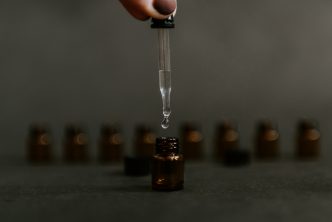Welcome to the 2nd part in our 3-part series on CBD. If you missed the first part, “CBD Basics,” you can read it here. On to part 2: “How CBD Works and Its Uses.”
How CBD Works and Its Uses
CBD’s therapeutic effects are tied to the body’s endocannabinoid system (ECS) that was discovered by Israeli scientist Prof. Raphael Mechoulam at the Hebrew University in Jerusalem, the same one who discovered the receptor for THC in the 60s.
The ECS system is mainly responsible for maintaining homeostasis—a “just right” balance—in the other systems of the body, including the central nervous system, the cardiovascular system, the digestive system (including the gastrointestinal tract, liver, gallbladder and pancreas), the musculoskeletal system, and the immune system.
The ECS is controlled by cannabinoid receptors on the surface of cells. The cannabinoids that activate these receptors are produced both in the body (such as anandamide, named for “ananda,” the Sanskrit word for “bliss”), and by plant or phytocannabinoids such as THC and CBD.
When there’s an imbalance in the ECS, you can develop symptoms such as anxiety and pain. CBD helps rebalance this messenger system. CBD boosts the “feel good” neurotransmitters such as serotonin and dopamine—the same mechanism of action as many antidepressant drugs—and is also effective in treating depression.
Anxiety
Forty million Americans suffer from anxiety disorders: the constant worry of generalized anxiety disorder; the shyness of social anxiety disorder; the panic of phobias; the re-experienced trauma of post-traumatic stress disorder; and the repetitive behaviors and thoughts of obsessive-compulsive disorder.
Unfortunately, widely used anti-anxiety medications, such as alprazolam (Xanax), lorazepam (Ativan) and clonazepam (Klonopin), to mention a few, are highly addictive and commonly cause side effects, including drowsiness, dizziness, fatigue, headaches and blurred vision, not to mention overdose, which can be fatal.
CBD, on the other hand, can be equally effective, and is much safer, non-addictive, and rarely produces side effects (see below).
SCIENTIFIC EVIDENCE: A 2015 review article by Blessing et al, published in Neurotherapeutics looked at a variety of experimental and clinical data and concluded that the evidence “strongly supports CBD as a treatment for generalized anxiety disorder, panic, social anxiety disorder, obsessive-compulsive disorder and post-traumatic stress disorder.”
SOCIAL ANXIETY: Do you have a fear of public speaking? Well, you’re not alone! In a study conducted by researchers at the University of Sao Paulo in Brazil, 24 people with social anxiety disorder were divided into two groups, with 12 taking CBD and 12 taking a placebo 90 minutes before a “simulation public speaking test.” Another group of 12 healthy participants also took the public speaking test without receiving any treatment.
During the test, the group taking CBD had significantly less anxiety, less mental confusion, and less discomfort in their performance, compared to the placebo group. They also barely registered on the “negative self-statement” scale. In fact, note the researchers, their performance almost the same as those without social anxiety disorder! [Neuropsychopharmacology. 2011 May;36(6):1219-26. doi: 10.1038/npp.2011.6. Epub 2011 Feb 9].
CANCELS OUT THC: CBD is so calming that it is able to neutralize the negative effects of THC such as paranoia and addiction. Researchers at Kings College in London found it can relieve the paranoia that sometimes accompanies the use of high-THC cannabis.
I certainly have applied this in practice, successfully giving such individuals a large dose of CBD rather than the usual treatment of strong psychiatric medication. This yields faster and better results, and avoids the individual being labeled psychotic and placed on these very strong meds indefinitely. [J Psychopharmacol. 2013 Jan;27(1):19-27. doi: 10.1177/0269881112460109. Epub 2012 Oct 5]
PTSD: CBD is an especially good treatment option for post-traumatic stress disorder, a devastating condition that typically responds poorly to conventional psychiatric medicines or therapies.
In post-traumatic stress disorder (PTSD), you have not been able to recover from the experience of a traumatic event that is shocking or frightening, such as combat trauma, sexual assault, a car accident, a natural disaster, or the loss of a loved one. You might continue to relive the trauma again and again—sparked by your own memory, or a situation that reminds you of the event. Your heart races and your palms sweat. You can have panic attacks during the day and nightmares while sleeping. Your symptoms can last for a couple months or a couple of decades.
Good news: CBD can help you process the traumatic memory once and for all.
SCIENTIFIC EVIDENCE: In a study of 48 people, researchers from the University of London found that taking CBD helped promote what psychologists call “fear extinction”—not automatically reacting negatively when faced with the possible repetition of a traumatic event. They gave half of them CBD and half of them a placebo—and all of them mild electric shocks from a colored box.
Two days later, they once again exposed them to the colored box—and those who had taken CBD were less likely to have fearful reactions. In other words, CBD did an excellent job of fear memory extinction. CBD, concluded the researchers in the journal Psychopharmacology, has the potential to treat anxiety disorders.
[Psychopharmacology (Berl). 2013 Apr;226(4):781-92. doi: 10.1007/s00213-012-2955-y. Epub 2013 Jan 10.]
HOW IT WORKS: CBD works by directly affecting the amygdala—the part of the brain that controls emotional memory—by literally “cleaning up” the emotional charge of traumatic memories. Psychologists call this process “Fear Memory Extinction”—and scientific research shows CBD is very effective at getting rid of “fear memory.” You may still have the memory—but when you experience it, you won’t feel that same fear and distress.
Pain Relief
More than 100 million Americans suffer from chronic pain—staggering numbers of which become hopelessly addicted to opioid pain medications or, worse, die of an overdose. But CBD can often relieve chronic pain—without the risk for addiction. Moreover, it has been used to successfully wean people off opioids and with a better result!
SCIENTIFIC EVIDENCE: A 2017 report from the Health and Medicine Division of the National Academies of Sciences reviewed all the current research on cannabinoids and health—and concluded, “In adults with chronic pain, patients who were treated with…cannabinoids are more likely to experience a clinically significant reduction in pain symptoms.” [https://www.ncbi.nlm.nih.gov/books/NBK425767/]
One patient’s story: I was treating a 65-year-old man who had back pain and sciatica from a herniated disc, for which he had been prescribed the painkiller tramadol (Ultram). While it provided pain relief, it also interfered with his mental clarity and he was well aware of its potential for addiction. I suggested CBD, gave it to him on the spot, and he quickly titrated up to the effective dose.
The result was no pain, no brain fog, and easy administration of the CBD throughout the day. With 3-4 dropperfuls a day of the 500 mg/2oz bottle was able to drop the opioid. He was a happy camper! He remains pain – free to this day, 2 years later, if he takes the CBD.
MY ADVICE: If you have chronic pain, start with 10- 16 mg of CBD oil daily, and gradually increase by a ½ to 1 dropper each time—until you get the desired effect. People have safely taken 100 mg or more. I find an average daily dose to be 50 mg but everyone has to find their own sweet spot.
In case you question whether this is just masking the pain, it is not, since CBD acts as a potent anti-inflammatory, remediating rather than simply covering over the pain.
Seizures, Alzheimers and More
Research shows that CBD can prevent seizures in patients with epilepsy. Plant-derived Epidiolex has also been miraculous for children with Dravet’s syndrome, a condition that can cause hundreds of seizures a day and has not been effectively treated with medication.
Its presence proves the point that – CBD works and is accepted in mainstream medicine. It’s a breakthrough, for sure! However, it’s pricey, and it’s an isolate i.e., contains only CBD. The full spectrum product can be obtained far more cheaply, taken successfully in lower doses and thus has far fewer side effects.
Like most plant medicines, CBD works much better as a full plant extract due to the synergy of the ingredients producing the entourage effect. More on this can be seen in CNN’s Dr. Sanjay Gupta’s documentary, “Weed,” showing his 180-degree shift in his opinion of cannabis.
Studies are also under way to determine whether it can help slow the progression of Alzheimer’s disease and Parkinson’s disease. Many doctors who recommend CBD in their practices have seen improved memory in older patients who are taking it—as well as improved alertness and sociability in Alzheimer’s patients. The mechanism appears to be its anti-inflammatory effect and its ability to enhance the production of neurotransmitters.
I was introduced to an 84-year-old woman who had been on a variety of medications for depression and anxiety. Her family reported that she was forgetful, irritable, and drowsy. I thought it was likely a result of the medication exacerbating any age-related cognitive decline, and ascertained that she no longer needed it.
I put her on a gradual withdrawal program with the help of various supplements to enhance neurotransmitters and ease the transition. We quickly titrated up to 2 droppers daily of CBD (500 mg in 2 oz bottle), and one 25 mg capsule twice daily. In a week or two, her confusion began to lift.
Within a month she was off her medications. At the end of 2 months, still on CBD, she was vastly improved, and here is what her daughter had to say in an email to me:
“It has been more than 10 years that we have seen our mother this good. Her mind is very sharp. Yesterday we took her to eat and she told me that we used to go to that restaurant once a week. Before, she was so sedated that she wouldn’t remember that we had been to that restaurant the day before! She would need to ask us constantly what day it was, and she would lay in the couch sedated the whole day. After only two months with you, she recovered her short and long-term memory, recovered her coordination and balance and stopped falling. And she hasn’t been depressed. She is more alive, more motivated and back to normal! We would like to thank you immensely for what you have done!”
Onto the final part in our series, “How to Use CBD.”






